Faculty Members
All the PhD Faculty Members are members of the Department of Pharmacy and Biotechnology.

Anna Maria Porcelli
PhD Coordinator / Department FaBiT
Research Area: Mitochondria dysfunction in cancer and neurodegenerative diseases
Research Projects:
She carries out her research in the field of cellular and molecular biochemistry with a particular interest in the role of mitochondria in metabolic and hypoxic adaptation during tumor progression. In recent years, the research has been focused on the role of respiratory complex I and its biogenesis as a modulator of cellular energetic competence and of metabolic rewiring that occurs in tumorigenesis. With the main aim to search for novel biomarkers to target synthetic lethality with mitochondrial function, in vitro, ex vivo, and in vivo cancer models are exploited and different biochemical, cell biology and omics tools are used in-house and in collaboration.
Link to scientific publications: https://www.unibo.it/sitoweb/annamaria.porcelli/publications
ORCID: https://orcid.org/0000-0002-6209-0692
SCOPUS: https://www.scopus.com/authid/detail.uri?authorId=57226204395
WOS: https://publons.com/researcher/1213501/anna-maria-porcelli
Collaborations: https://www.unibo.it/sitoweb/annamaria.porcelli/collaborations
An ideal Ph.D. candidate should possess
- Master's Degree in Biology and Biotechnology related fields
- Knowledge in biochemistry, cell and molecular biology
- Basic skills in biochemistry and cell biology techniques would be an advantage
- Strong commitment, motivation, and discipline to work in a team and independently
- Scientific curiosity and interest in learning new skills
- Good ability to communicate and write in English

Vincenzo Scarlato
PhD Vice-Coordinator / Department FaBiT
Research Area: Molecular Biology and Genomics of Prokaryotes
Research Projects:
The Helicobacter pylori gene hp1043 encodes the essential transcriptional regulator HP1043, for which some structural data are available. We aim to tackle the regulatory role of HP1043 and its involvement in the pathogenesis through the control of the small regulatory RNA, CncR1. We will define the complete interactome of CncR1 sRNA by implementing a recently developed functional genomics approach called MAPS (MS2 affinity purification coupled with RNA sequencing).
The second line of research aims to identify and characterize molecules able to disrupt HP1043 function and block H. pylori infection. To pursue this objective, we have generated and validated a structural model of HP1043 interacting with DNA to carry out virtual screening of libraries of molecules to identify ligands predicted to bind HP1043 dimerization and/or DNA-binding interface, thereby blocking its regulatory activity. Identified molecules will be experimentally validated in vitro on the purified protein and in vivo using E. coli reporter strains and H. pylori cell cultures.
Link to scientific publications:
https://www.unibo.it/sitoweb/vincenzo.scarlato/publications
ORCID: https://orcid.org/0000-0003-4227-677X
SCOPUS: https://www.scopus.com/authid/detail.uri?authorId=7005527009
WOS: https://publons.com/researcher/1684795/vincenzo-scarlato/
SCHOLAR: https://scholar.google.co.uk/citations?user=cAkOxPgAAAAJ
Collaborations:
https://www.itb.cnr.it/en/institute/staff/federica-chiappori/
https://it.gsk.com/it-it/ricerca/il-centro-ricerche-di-siena/
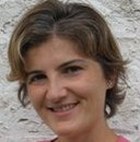
Elena Bacchelli
Faculty Member / Department FaBiT
Research Area: Genetics Factors in Autism Spectrum Disorders

Martina Cappelletti
Delegate for internazionalization / Department FaBiT
Research Area: Molecular Environmental Microbiology
Research Projects:
The group studies the genomic, molecular and biotechnological aspects of the microbial interaction with organic and inorganic contaminants and the bacterial response to environmental stresses and toxic compounds.
Link to scientific publications: https://www.unibo.it/sitoweb/martina.cappelletti2/publications
ORCID: https://orcid.org/0000-0002-6238-8296
SCOPUS: https://www.scopus.com/authid/detail.uri?authorId=24472574900
WOS: https://publons.com/researcher/3912836/martina-cappelletti/
Collaborations:
https://www.unibo.it/sitoweb/martina.cappelletti2/collaborations
https://site.unibo.it/molecular-environmental-microbiology-lab/it/partners
An ideal Ph.D. candidate should possess:
- Master's Degree in Molecular and Cellular Biology, Molecular and Industrial Biotechnology, or related fields
- Basic knowledge in general microbiology, molecular biology of prokaryotes and microbial genomics
- Basic skills in molecular biology and microbiology techniques
- Strong commitment, motivation, and discipline to work efficiently both independently and within a group
- Excellent ability to communicate and write in English

Giovanni Capranico
Faculty Member / Department FaBiT
Research Area: Cancer genome instability
Professional Activity and Positions Held
1.10.2006-present Full Professor of Molecular biology, Department of Pharmacy and Biotechnology University of Bologna, Bologna, Italy
28.06.08-20.09.08 Visiting Professor, Laboratory of Molecular pharmacology, National Cancer Institute, NIH, Bethesda, MD, USA.
1.11.1998-30.9.2006 Associate Professor of Molecular biology, Department of Biochemistry, Faculty of Pharmacy, University of Bologna, Italy
1997-1998 Adjunct Professor, University of Pauda, School of Pharmacy, Padua, Italy.
1998 Chief, Molecular Pharmacology Unit, Department of Experimental oncology, National Cancer Institute, Milan, Italy
1990-1997 Senior investigator, Experimental oncology B, National Cancer Institute, Milan, Italy.
06/1988-06/1990 Guest Researcher, Laboratory of Molecular Pharmacology, National Cancer Institute, National Institutes of Health, Bethesda, MD, USA.
02/1986-11/1990 Associate Researcher, Experimental oncology B, National Cancer Institute, Milan, Italy.
01/1983-01/1986 Fellow, Experimental oncology B, National Cancer Institute, Milan, Italy.
Education
07/1982
Laurea in Biological sciences, final score summa cum laude, University of Perugia, Perugia.
Final thesis on “Synthesis of phospholipids in the membrane prepared from rat brains”, Department of Biological Chemistry (G Porcellati, L Binaglia), School of Medicine.
Professional Board and Examination
1985 National Exam for the Profession of Biologist, University of Milan.
1988 National Board of Biologists.
Main Externally-Funded Research Grants
2015 Three-year grant from the Associazione Italiana per la Ricerca sul Cancro, Milan, Italy 2010 Three-year grant from the Associazione Italiana per la Ricerca sul Cancro, Milan, Italy
2007 Three-year grant from the Associazione Italiana per la Ricerca sul Cancro, Milan, Italy
2005 National coordinator of a two-year grant (DNA topoisomerase I and development of new inhibitors) from The Ministry of University and Scientific Research under the PRIN program, Rome, Italy.
2003 National coordinator of a two-year grant (Functions and structure of DNA topoisomerase I) from The Ministry of University and Scientific Research under the PRIN program, Rome, Italy.
2001 National coordinator of a two-year grant (DNA topoisomerase I) from The Ministry of University and Scientific Research under the PRIN program, Rome, Italy.
2001 Three-year grant from the Associazione Italiana per la Ricerca sul Cancro, Milan, Italy.
1999 Unit PI of a two-year grant (Chromatin dynamics and gene expression) from The Ministry of University and Scientific Research under the PRIN program, Rome, Italy.
1999 One-year contract with Menarini Ricerche Sud, Pomezia (Roma) for a screen program for new DNA topoisomerase I inibitors.
1999 One-year grant from CNR, Rome.
1998 Three-year grant from the Associazione Italiana per la Ricerca sul Cancro, Milan, Italy (PI).
1998 Two-year grant from European Commission, INTAS program, Brussels, Belgium.
1995 Three-year grant from the Associazione Italiana per la Ricerca sul Cancro, Milan, Italy (PI).
1994 One-year grant from the Associazione Italiana per la Ricerca sul Cancro, Milan, Italy (PI).
1994 Two-year research grant under the European Union BIOMED I Programme, Brussels, Belgium.
1992 Five-year grant under the program “Clinical Applications of the Cancer Research” of CNR, Rome, Italy (PI).
Research Contracts and Collaborations with Industry
2015-2016 Menarini Ricerche Sud, Pomezia, Italy
1990-1994 Boehringer-Ingelman Mannheim, Monza, Italy
1999-2000 Menarini Ricerche Sud, Pomezia, Italy
Research bibliometric parameters (updated on 06/20/2016)
Total items in ISI Web of Knowledge 134
Total publications in PubMed 115
From ISI Web of Knowledge
h- index 37
Total citations 4289
Total citations without self-citation 3753
Average citation/item 32
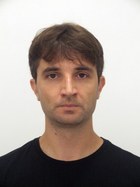
Francesco Chemello
Faculty Member / Department FaBiT
Research Area: Gene editing of muscle disorders
Research Project:
Francesco Chemello holds the position of Associate Professor of Genetics (BIO/18) at the Department of Pharmacy and Biotechnology of the University of Bologna. His research focuses on genome editing for treating genetic diseases, particularly targeting DNA mutations associated with skeletal and cardiac muscle pathologies.
Link to scientific publications: https://www.unibo.it/sitoweb/francesco.chemello2/publications
ORCID: https://orcid.org/0000-0002-3877-527X
SCOPUS: https://www.scopus.com/authid/detail.uri?authorId=57217037811
WOS: https://www.webofscience.com/wos/author/record/2096402
Collaborations: https://www.unibo.it/sitoweb/francesco.chemello2/collaborations

Dario de Biase
Faculty Member / Department FaBiT
Research Area: Molecular characterization of solid tumors
Relevant Pubblications:
Expression of 19 microRNAs in glioblastoma and comparison with other brain neoplasia of grades I-III
TERT Promoter Mutations in Papillary Thyroid Microcarcinomas
Long-term survivors of pancreatic adenocarcinoma show low rates of genetic alterations in KRAS, TP53 and SMAD4
Non-canonical IDH1 and IDH2 mutations: a clonal and relevant event in an Italian cohort of gliomas classified according to the 2016 World Health Organization (WHO) criteria
Molecular diagnostic of solid tumor using a next generation sequencing custom-designed multi-gene panel
Main collaboration:
Dr. Umberto Malapelle, Chief Supervisor of Predictive Molecular Pathology Laboratory, University of Naples Federico II, Naples Italy
Dr.ssa Ciarrocchi, Head of Translational Research Laboratory, AUSL-IRCCS Reggio Emilia, Italy

Alberto Danielli
Delegate for Teaching activities / Department FaBiT
Reasearch Area: Molecular biotechnology of phages for the development of theranostic vector platforms
AD is an Associate Professor of Molecular Biology (BIO/11) at the Department of Pharmacy and Biotechnology of the University of Bologna. He has a strong background in fundamental aspects of gene regulation and molecular cell biology of infectious pathogens and disease vectors. His group is actively involved in phage biotechnological research, combining molecular techniques with synthetic biology approaches to exploit filamentous phages as therapeutic vectors, as well as nanobiotechnological scaffolds for biosensors and bio-conjugations.

Fabrizio Ferrè
Faculty Member / Department FaBiT
Research Area: Computational and functional genomics
Professional Experience
Nov 2014 – Current: Associate Professor of Molecular Biology. Alma Mater Studiorum University of Bologna, Department of Pharmacy and Biotechnology (FaBiT), Bologna – Italy
Jun 2011 – Oct 2014: Research fellow at the Centre for Molecular Bioinformatics (CBM), directed by Professor Manuela Helmer Citterich, working on computational genome analysis. University of Rome Tor Vergata, Department of Biology, Rome – Italy
Dec 2011 – Mar 2013: Research fellow at CASPUR/CINECA (Inter-University Consortium for the Application of Super-Computing for Universities and Research). CASPUR, Rome – Italy
Jun 2008 – May 2011: FIRB Researcher in the Biocomputing unit (directed by Prof. Anna Tramontano), working on structural bioinformatics and computational genomics. University of Rome La Sapienza, Department of Biochemical Sciences A. Rossi Fanelli, Rome - Italy
Nov 2006 – Jun 2008: Application Specialist II in the Stem Cell Program - Genomics Core (directed by Prof. Leonard Zon), working on comparative genomics and genome annotation. Harvard Medical School, Children's Hospital, Hematology/Oncology Department, Boston MA - USA
Jul 2003 – Nov 2006: Post-doctoral research fellow in the Computational Biology group of Prof. Peter Clote, working on gene expression time series analysis and clustering, machine learning applied to protein sequences, and different aspects of RNA folding and biology. Boston College, Biology Department, Chestnut Hill MA – USA
Education
Nov 1999 – May 2003: Ph.D. in Molecular and Cell Biology, working in the Centre for Molecular Bioinformatics (CBM), directed by Professor Manuela Helmer Citterich. Thesis title: “A computational approach to the analysis and comparison of protein functional surfaces”. University of Rome Tor Vergata, Biology Department, Rome - Italy
Nov 1992 – May 1999: B.S. – M.Sc. in Biology (110/110 cum laude). Experimental thesis in the Molecular Genetics lab, directed by Professor Gianni Cesareni, with the supervision of Professor Franco Felici. Thesis title: “Methods to modulate peptides exposition on phage capsids in libraries selections”. University of Rome Tor Vergata, Biology Department, Rome – Italy

Anna Maria Ghelli
Faculty Member / Department FaBiT
Research Area: Mitochondria disfunctions in cancer and neurodegenerative diseases
Research Projects:
Anna Ghelli is an associate professor at the Department of Pharmacy and Biotechnology. She is a cellular biochemist specialized in bioenergetics. Her work is focused on biochemical aspects of human mitochondrial diseases. In particular, her interest is on understanding the molecular mechanisms underlying the respiratory chain complexes deficiencies in neurodegenerative diseases and cancer.
Link to scientific publications: https://www.unibo.it/sitoweb/annamaria.ghelli/publications
ORCID: https://orcid.org/0000-0003-0830-0000
SCOPUS: https://www.scopus.com/authid/detail.uri?authorId=6701687871
Collaborations: https://www.unibo.it/sitoweb/annamaria.ghelli/collaborations
An ideal PhD candidate should possess:
- Master's Degree in Biology, Biotechnology, chemistry, pharmaceutical technologies, or related fields.
- Knowledge in general biochemistry, enzymology, mitochondrial biology, respiratory chain structure and function is desirable.
- Basic skills in biochemistry and molecular biology techniques would be an advantage.
- Strong commitment, motivation, and discipline to work independently and in a group.
- Good ability to discuss results and share experience and knowledge.
- Good ability to communicate and write in English.

Federico Manuel Giorgi
Faculty Member / Department FaBiT
Research Area: Computational transcriptomics of human gene networks
Research Projects:
The group carries out its research in the field of transcriptomics, trying to understand the quantitative changes in gene expression across physiopathological processes such as tumorigenesis, viral infection, organ development, drug addiction, and somatic mutations. The group writes algorithms for the analysis of the most up-to-date technologies for quantification of transcriptomics, such as Illumina and Oxford Nanopore, using bulk and single-cell resolution data. Current aims are the deconvolution of multi-omics datasets, co-measuring, in thousands of cells, gene expression, metabolite abundance and chromatin status, via a combination of RNA-Seq, ATAC-Seq and Metabolomics approaches.
Link to scientific publications: https://www.unibo.it/sitoweb/federico.giorgi/publications
ORCID: https://orcid.org/0000-0002-7325-9908
SCOPUS: https://www.scopus.com/authid/detail.uri?authorId=57205652168
WOS: https://publons.com/researcher/3394238/federico-m-giorgi/
PUBMED: https://pubmed.ncbi.nlm.nih.gov/?term=federico+giorgi&sort=date&size=200
Collaborations:
https://www.unibo.it/sitoweb/federico.giorgi/collaborations
An ideal PhD candidate should possess:
- Master's Degree in Bioinformatics, Biology, Biotechnology, Computational Biology, or fields related to Molecular Biology and Computational Sciences
- Knowledge in these topics is desirable: molecular biology, mechanisms of regulation of gene expression, bioinformatics databases
- Basic skills in R programming would be an advantage
- Strong commitment, motivation, and discipline to work independently and efficiently in a highly communicative environment
- Excellent ability to communicate and write in English

Luisa Iommarini
Faculty Member / Department FaBiT
Research Area: Mitochondrial dysfunction in human pathology
Research Projects:
The MitoB&B research group focuses on the role of mitochondria in the context of human pathology with a particular interest in cancer and primary mitochondrial diseases. Moreover, the research group investigates the mechanism of assembly of respiratory complexes and the effect of mutations in genes encoding for structural subunits or assembly factors for these macromolecular complexes.
Link to scientific publications: https://www.unibo.it/sitoweb/luisa.iommarini2/pubblicazioni
ORCID: https://orcid.org/0000-0002-6804-7302
SCOPUS: https://www.scopus.com/authid/detail.uri?authorId=16549467300
WOS: https://www.webofscience.com/wos/author/record/376543
Collaborations: https://www.unibo.it/sitoweb/luisa.iommarini2/collaborazioni

Elena Maestrini
Faculty Member / Department FaBiT
Research Area: Genetics Factors in Autism Spectrum Disorders
- Molecular genetics analysis of Autism Spectrum Disorders (ASD): identification and characterization of genes involved in the pathogenesis of ASD
- Analysis of susceptibility genes for nicotine dependence
Brief CV:
I graduated in 1989 from the University of Pavia, Italy, where I studied Biology and Genetics and trained as a Ph.D. student at IGBE-CNR, Pavia, Italy, under the supervision of Dr. Daniela Toniolo. During this time, I gained experience in human molecular genetics. I have been involved in physically mapping the human X chromosome and identifying genes responsible for two X-linked genetic diseases: Emery-Dreifuss muscular dystrophy and Barth syndrome.
From 1994 to 1999, I have been a post-doctoral fellow in Prof. Anthony Monaco's laboratory at the Wellcome Trust Centre for Human Genetics in Oxford, UK. My main research interest has been investigating the genetic basis of autism and related disorders.
Since 1999 I have been appointed as a lecturer (associate professor) at the University of Bologna. My research has focused on the molecular genetics of autism and other complex disorders, collaborating in different European and international consortia (IMGSAC, Autism Genome Project).
My current teaching activity includes teaching Genetics in the "Biotechnology" Degree program and Human Molecular Genetics in the "Health Biology" master's degree course at Bologna University. I also participate in the "Cellular and Molecular Biology" Ph.D. program.

Jessica Marinello
Faculty Member / Department FaBiT
Research Area: Cancer Genome Instability
Research Project:
Our research focuses on how non-B DNA structures affect chromatin organization, genome functions and stability on one side, and how DNA topoisomerases regulate them on the other. We are particularly interested in R loops and G-quadruplex (G4). R-loops are formed during transcription upon re-annealing the nascent RNA to the DNA template strand, forming an RNA: DNA hybrid and forcing the non-template strand to loop out in a single-stranded status. G4s are instead generated by single-stranded guanine-rich DNA sequences that fold into stable four-stranded structures wherein three sets of four guanines are arranged in three stacking planar quartets.
Link to scientific publications:
https://www.unibo.it/sitoweb/jessica.marinello/pubblicazioni
https://orcid.org/0000-0002-2356-869X
https://www.scopus.com/authid/detail.uri?authorId=35368942200
https://www.webofscience.com/wos/author/record/16200043
ORCID: 0000-0002-2356-869X
SCOPUS: 35368942200
WOS: DYZ-9641-2022
Collaborations:
https://www.unibo.it/sitoweb/jessica.marinello/collaborazioni
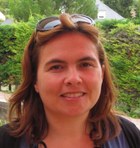
Barbara Monti
Faculty Member / Department FaBiT
Research Area: Molecular basis of neurodegenerative diseases
Barbara Monti graduated with honors in Biological Science at the University of Bologna in 1996. In 2001, she achieved the Ph.D. degree in Cellular Biology and Physiology under the supervision of Prof. Antonio Contestabile, working on the molecular mechanisms of neuronal apoptosis in in vitro and in vivo models at the Department of Biology of the University of Bologna. In 1999-2000, she spent several research periods on gene expression in long-term memory at the Laboratory of Dr. Cristina Alberini, Department of Neuroscience, Brown University (Providence, R.I., U.S.A); a period was in the framework of a Ph.D. student exchange between the University of Bologna and the Brown University then she has been awarded by a short-term fellowship from the Human Frontier Science Program Organization. From December 2000 to September 2005, she had a Post-Doc position in the Lab of Prof. Antonio Contestabile, Department of Biology of the University of Bologna, working on neurodegeneration and memory deficits in aging. In 2005, she was awarded a “L’Oreal Italy fellowship for women in science” and in 2006 the SIF 2006 prize from the “Italian Society of physiology”, as the best young researcher of the year. Since October 2006 she has been a “Ricercatore” (equivalent to assistant professor) at the Department of Biology of the University of Bologna. For the period May-July 2008, she was a visiting scientist in the BRAINS lab of Prof. Deniz Kirik at Lund University (Sweden), in the framework of EU Marco Polo Project. Since 2012, she has been part of the Department of Pharmacy and Biotechnology and, since November 2013, a member of the Academic Board of the Ph.D. in Cellular and Molecular Biology. Since September 2014, she has been an Associate Professor at the Department of Pharmacy and Biotechnology, University of Bologna. BM has been the coordinator of several research projects, including PRIN, Telethon, MAECI (Italia-USA). Her research is mainly focused on studying the interactions between glial cells and neurons in physiological conditions and how they change in neurodegenerative diseases by using both in vitro and in vivo models. BM is the author of 48 papers in international peer-reviewed journals, 14 of which as first author and 10 as the corresponding author. h-index: 18; Citations: 1510 (Data from Scopus on March 9th, 2017).

Marco Rinaldo Oggioni
Faculty Member / Department FaBiT
Research Area: Microbial and innate immune mechanisms at the start of infection
Research Projects:
The work into the pathogenesis of invasive bacterial infections focuses on the earliest molecular and cellular events in the interaction of bacteria and tissue-resident macrophages using in vitro cellular models, in vivo experimental infection models, and ex vivo whole human organ perfusion and infection. Research tools include microscopy and molecular analyses.
The work on microbial genetics focuses on epigenetic gene regulation in prokaryotes. DNA methylation and gene regulation. Work also includes genome analysis to characterise selections shaping microbial evolution.
Link to scientific publications: https://www.unibo.it/sitoweb/marcorinaldo.oggioni/publications
ORCID: https://orcid.org/0000-0003-4117-793X
SCOPUS: https://www.scopus.com/authid/detail.uri?authorId=57203558449
WOS: https://publons.com/researcher/2241542/marco-rinaldo-oggioni/
Collaborations: University of Leicester; GSK Vaccines, Siena
An ideal PhD candidate should possess:
- Master's Degree in any Biomedical degree
- Knowledge in microbiology, cell biology or genomics is desirable
- Experimental infections may be part of some research project
- Strong commitment, motivation, and discipline to work independently and efficiently
- Excellent ability to communicate and write in English

Giovanni Perini
Faculty Member / Department FaBiT
Research Area: Gene expression regulation in cancer
October 1987: Doctoral degree in Biological Sciences (mark 110/110 summa cum laude), University of Pavia, Pavia, Italy.
PROFESSIONAL EXPERIENCE
1988-1992: Training activity at the Institute of "Genetica Biochimica ed Evoluzionistica, CNR", Pavia, Italy. Supervisors: Prof. Silvano Riva.
1993-1998: Postdoctoral fellow "Program in Molecular Medicine, University of Massachusetts Medical School Worcester Ma, USA. Supervisor: Prof. Michael R. Green.
1999-2004: Assistant Professor of Genetics, University of Bologna, Bologna, Italy.
2005-2014: Associate Professor of Genetics, University of Bologna, Bologna, Italy
2014-to date: Professor of Genetics, University of Bologna, Bologna, Italy
FELLOWSHIPS
1988. One-year Fellowhsip from "Istituto di Ricovero e Cura a Carattere Scientifico (IRCCS), Policlinico San Matteo”, Pavia, Italy.
1989. Fellowship from "A. Buzzati-Traverso Foundation", Rome, Italy.
1990. Postdoctoral fellowship from Italian Association for Cancer Research (AIRC), Milan, Italy.
1993. Postdoctoral fellowship from the International Agency for Research on Cancer (IARC) Lyon, France
1995-1998. Postdoctoral fellowship from Howard Hughes Medical Institute, Baltimora, USA.
AWARDS
2012. Award for best oral presentation at the ANR2012 ( Advances in Neuroblastoma Research) May 18-23 2012. Toronto Canada.
TEACHING ACTIVITIES.
Since 2005, he has been teaching courses in Molecular Genetics, Genomics, and Epigenetics in the Undergraduate Programs of Biological Sciences and Biotechnology and in the Master's degree Programs of Molecular and Cellular Biology and Molecular Biotechnology.
He has also been the supervisor of 9 Ph.D. theses, 18 Master's degree theses, and more than 60 undergraduate theses in Molecular Genetics of Cancer.
He also served as an external referee for the evaluation of the final Ph.D. thesis work of candidates enrolled in Ph.D. programs at the Universities of Bari, Naples, Milan, Modena, Ferrara, UCL (London), Cancer Children's Hospital, Baylor College (Houston, TX, USA).
FOUNDS
IV Framework European Program,2000; Young scientist national program, 2002 (Italy); AIRC 2005 (Italy); PRIN 2006; Children Cancer Institute Australia, 2008-2010 Sydney, Australia; University of Bologna 2003-2011; Telethon 2010; PRIN2009, 2011; AIRC (Milan, Italy) 2011; AIRC (Milan Italy) 2014; NHMRC 2015 Sydney, Australia; CCIA 2016 Sydney, Australia
PUBLICATIONS
He is the author of more than 70 papers in international peer-reviewed journals. h-index: 26; citations: 2062 (Scopus, March 9th, 2017).
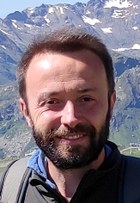
Davide Roncarati
Faculty Member / Department FaBiT
Research Area: Molecular and genetic basis of bacterial pathogenesis
Davide Roncarati is an Associate Professor in Molecular Biology at the Department of Pharmacy and Biotechnology (University of Bologna - Italy).
His research combines biochemistry, genetics, and molecular biology to address the molecular mechanisms adopted by bacteria to gauge the surroundings and modulate gene expression accordingly. His present research focuses on the study of fundamental molecular mechanisms that regulate the expression of genes and virulence factors in pathogenic bacteria, such as Helicobacter pylori and Campylobacter jejuni. He is also actively involved in ongoing collaborations with other Italian and European groups, carrying on studies aimed at the characterization of transcriptional and posttranscriptional regulatory mechanisms in other bacterial species such as Pseudomonas aeruginosa, Shigella flexneri, and Neisseria meningitidis.
The research group in which Prof. Roncarati is based has acknowledged expertise in the analysis of gene expression as well as in protein-DNA interaction and transcription studies at both the biochemical, molecular, and systems levels.

Francesca Sparla
Faculty Member / Department FaBiT
Research Area: Molecular mechanisms of redox signalling and energy metabolism regulations in plants
Francesca Sparla is a professor of Plant Molecular Biology at the University of Bologna. In 1994 she received her degree in Biology with honour, and in 1997 she obtained the qualification to the biologist profession. She received her Ph.D. in “Cell Biology and Physiology” from the University of Bologna (Italy) in 1999, with a Ph.D. thesis entitled “Purification, biochemical characterization and cloning of a NAD(P)H: quinone oxidoreductase: a plant homologous of animal DT-diaphorase”.
During her post-doc fellowship, her research interest turned to the regulatory properties and three-dimensional structure of glyceraldehyde-3-phosphate dehydrogenase (GAPDH), a key enzyme of photosynthetic carbon assimilation. Actually, Prof. Sparla's scientific interests include studies on the regulation of enzymes of chloroplast stroma and starch metabolism.
Her teaching activities include:
“Plant Molecular Laboratory”, Cellular and Molecular Biology master degree (University of Bologna, Italy);
“Plant Molecular Biology”, Biotechnology degree (University of Urbino; Italy);
“Plant Morphology and Physiology”, Biology degree (University of Bologna, Italy);
"Plant Biology", Pharmacy master degree (University of Bologna, Italy).
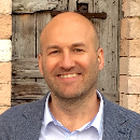
Paolo Bernardo Trost
Faculty Member / Department FaBiT
Research Area: Molecular mechanisms of redox signalling and energy metabolism regulations in plants
Paolo Bernardo Trost is a full Professor of Plant Physiology at the University of Bologna since 2013. Together with his research group and in strict collaboration with Italian and foreign labs, he works on proteins and enzymes of plants, mostly involved in electron transfer reactions (redox) of photosynthetic metabolism and redox proteins of plant plasma membranes. Author of more than 100 scientific publications and about 50 lectures or research seminars in congresses and national and international scientific institutions. Professor for the degrees of Biological Sciences, Biotechnology, and Cell and Molecular Biology. He is the President of the Italian Society of Plant Biology.

Beatrice Vitali
Faculty Member / Department FaBiT
Research Area: Phylogenetic and functional characterization of human and environmental microbial communities: the study of the interactions between microorganisms and their habitat
Beatrice Vitali is an Associate Professor in Microbiology at the University of Bologna. She carries out her research in the field of human microbial ecosystems. The research interests are aimed at (i) the study of the interactions between mutualistic bacteria, pathogens and host cell epithelium, (ii) the understanding of the molecular mechanisms underlying the health-promoting effects of probiotic bacteria. She is the author of numerous publications in international scientific journals, book chapters, and patents. She collaborates with several national and international research groups.

Mirko Zaffagnini
Faculty Member / Department FaBiT
Research Area: Molecular enzymology and redox signalling/regulation in plants
Research Projects:
The group carries out its research in the field of plant biochemistry, trying to unravel the biochemical and regulatory properties of plant enzymes involved in carbon-related pathways and redox homeostasis. The group conducts collaborative research with Italian and foreign labs based on a multidisciplinary approach involving biochemical, biophysical, and computational methods. Current aims focus on understanding the functional and structural details of photosynthetic enzymes and determining the molecular mechanisms underlying redox-based regulatory systems in model photosynthetic organisms.
Link to scientific publications: https://www.unibo.it/sitoweb/mirko.zaffagnini3/publications
ORCID: https://orcid.org/0000-0001-5115-0859
SCOPUS: https://www.scopus.com/authid/detail.uri?authorId=9436956300
Collaborations: https://www.unibo.it/sitoweb/mirko.zaffagnini3/collaborations

Barbara Zambelli
Delegate for Communication / Department FaBiT
Research Area: Structures and functions of metallo-proteins
Barbara Zambelli is an Associate Professor at the Department of Pharmacy and Biotechnology of the University of Bologna. Her research activity deals with the study of protein interactions that regulate metal-driven pathologies such as cancer and infection. The activity focuses on intracellular nickel metabolism and its effects on human health. The research approach is multi-disciplinary and involves methods of protein biochemistry and biophysics to understand the structural and functional details of the proteins of interest.
Biosketch
Barbara Zambelli graduated cum laude in Industrial Biotechnology in 2002 at the University of Bologna and obtained her Ph.D. in 2006. She was a visiting scientist at the Department of Biochemistry, University of Gent (2003), and was awarded an EMBO (European Molecular Biology Organization) Short Term Fellowship to visit the EMBL of Hamburg (2005). She serves as Associate Editor of Scientific Reports, Biomolecules, and PeerJ. She is the author of ca. 70 peer-reviewed articles in international journals. The scientific activity and the bibliographic parameters are visible in Google Scholar and Scopus.